
L'avenir est là alors que les villes flottantes deviennent réalité
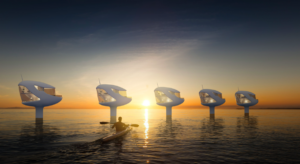
De la Corée du Sud au Panama, en passant par les Maldives, une nouvelle vague de vie sur l'eau s'installe. Mais ce n'est pas sur les bateaux. Il s'agit de villes flottantes, conçues dans un souci d'éco-conscience et en conséquence directe du changement climatique.
Le défi est énorme : deux personnes sur cinq dans le monde vivent à moins de 100 km de la côte, et 90 % des mégapoles du monde sont vulnérables à l'élévation du niveau de la mer, selon l'ONU. Les inondations détruisent des milliards de dollars d'infrastructures et obligent des millions de réfugiés climatiques à quitter leur foyer. Sans nulle part où se développer, la croissance rapide de la population urbaine rapproche les gens de l'eau, fait grimper les coûts de logement à des niveaux prohibitifs et évince les familles les plus pauvres.
Le prototype de Busan pour les villes flottantes prévu pour 2025
Oceanix Busan , de Corée du Sud, est présenté comme "le premier prototype au monde d'une communauté flottante résiliente et durable". Les promoteurs disent qu'il est construit pour aider les villes côtières, comme Busan, menacées par la montée du niveau de la mer. Le prototype - qui vise à être terminé d'ici 2025 - a été soutenu par le projet des Nations Unies Habitat . Il sera résistant aux inondations et sera composé d'une série d'îles qui s'élèvent avec la mer.
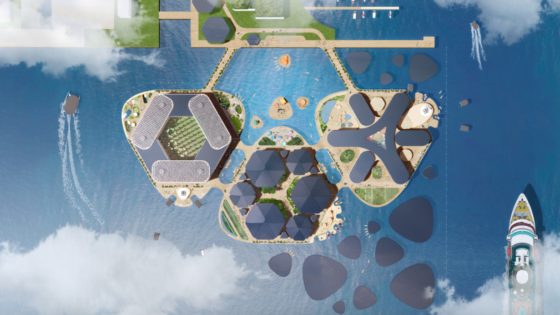
À 15,5 acres, le plan est d'accueillir initialement une communauté de 12 000 personnes sur trois plates-formes, pouvant atteindre 100 000 personnes à l'avenir à mesure que des plates-formes sont ajoutées. Les plates-formes flottantes comprendront des panneaux photovoltaïques et des serres et il y aura des quartiers distincts pour la vie, la recherche et l'hébergement (apparemment des chambres d'hôtes avec des repas bio).
Chaque quartier est intégré à des systèmes intégrés qui génèrent l'énergie nécessaire sur place, traitent et reconstituent l'eau, réduisent et recyclent les ressources et fournissent une agriculture urbaine pour répondre à un régime alimentaire local à base de plantes, expliquent les promoteurs.

Les développeurs disent que les bâtiments seront des bâtiments en bois de faible hauteur qui seront répartis pour équilibrer le poids uniformément.
Maldives Floating City pour prévisualiser les maisons en 2022
En juin 2022, Dutch Docklands Maldives a acquis les dernières signatures nécessaires pour démarrer Maldives Floating City.
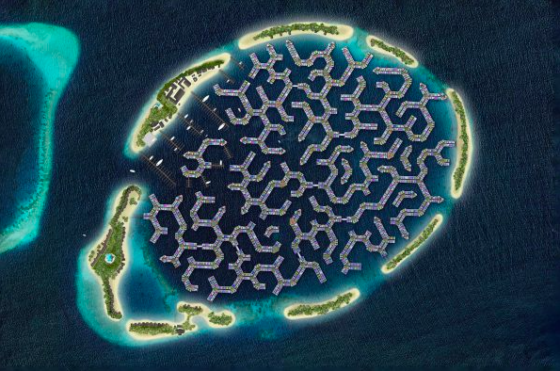
Ce projet de logement est en cours de développement dans un lagon à 15 minutes en bateau de Malé et vise à comprendre 5 000 logements, attachés au fond du lagon et reliés entre eux.
Dutch Dockland Maldives est un partenariat public-privé avec le gouvernement des Maldives avec le premier bloc de maisons flottantes (construit par Bison Maldives) qui doit être transporté vers le lagon et ouvert à la fin de l'été (2022).
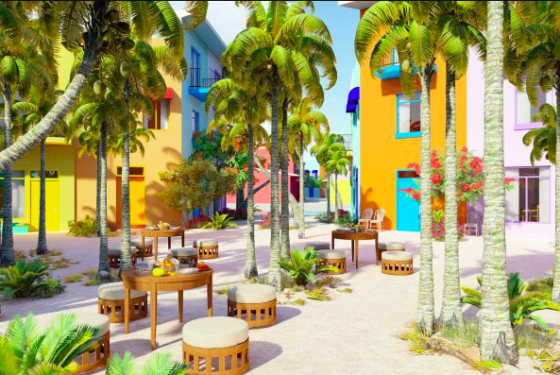
La construction de la ville modulaire devrait donc commencer en janvier 2023 et durera quatre à cinq ans pour se terminer avec un mélange de maisons, d'hôtels, de boutiques, de restaurants et d'une marina.
"Cette ville flottante des Maldives ne nécessite aucune remise en état des terres, a donc un impact minimal sur les récifs coralliens", déclare Mohamed Nasheed, président des Maldives de 2008 à 2012. "De plus, de nouveaux récifs géants seront cultivés pour agir comme briseurs d'eau. Notre adaptation (sic) au changement climatique ne doit pas détruire la nature mais fonctionneravec elle, comme le propose Maldives Floating City. Aux Maldives, nous ne pouvons pas arrêter les vagues, mais nous pouvons monter avec elles.
Les bâtiments flotteront à la surface de l'eau, mais des barrières insulaires autour du lagon serviront de disjoncteurs sous la ligne de flottaison pour aider à atténuer l'impact des vagues.
Qu'est-ce que ça fait de vivre dans des villes flottantes ?
Selon la BBC , les habitants vont s'habituer au mouvement dans les villes flottantes.
Schoonschip, conçu par la firme néerlandaise Space&Matter , se compose de 30 maisons, sur un canal à Amsterdam. Siti Boelen, une résidente, raconte que lorsqu'elle a emménagé pour la première fois, le temps orageux l'a fait réfléchir à deux fois avant de s'aventurer dans sa cuisine au troisième étage, où elle a le plus ressenti le mouvement. "Vous le sentez dans votre estomac", a-t-elle déclaré à la BBC, ajoutant qu'elle s'était depuis habituée à cette sensation.
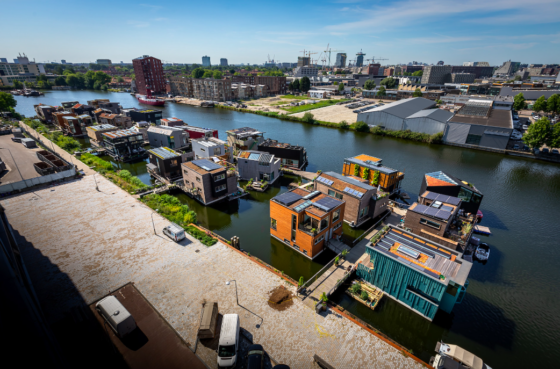 vue aérienne de la goélette. Image reproduite avec l'aimable autorisation de spaceandmatter
vue aérienne de la goélette. Image reproduite avec l'aimable autorisation de spaceandmatterPendant les tempêtes, le quartier glisse de haut en bas sur ses piliers de fondation en acier, s'élevant avec l'eau et redescendant vers sa position d'origine après la fin de la pluie.
"Nous nous sentons plus en sécurité dans une tempête parce que nous flottons", explique Boelen. "Je pense que c'est un peu étrange que la construction sur l'eau ne soit pas une priorité dans le monde entier."
SeaPods pour deux à venir en 2023
Une approche différente est prise au Panama où Ocean Builders plante des Seapods dans le fond marin. La société affirme que son objectif final est d'avoir des maisons SeaPod dans tous les coins de l'océan plutôt que l'une des conceptions étroitement liées d'autres villes flottantes.
Ces maisons de luxe arrondies pour deux personnes et trois étages et demi jaillissent de l'eau au moyen de longues tiges d'acier. Chaque pod est conçu pour offrir une vue imprenable à 360 degrés sur l'océan et la distance exacte à parcourir pour faire l'épicerie, la communauté ou les soins de santé (bien que les drones soient censés répondre à la plupart des besoins).
Ocean Builders indique que les 100 premiers pods seront soit en production, soit livrés d'ici la fin de 2023, et la société espère lancer le déploiement de 1 000 structures supplémentaires au cours de l'année suivante.
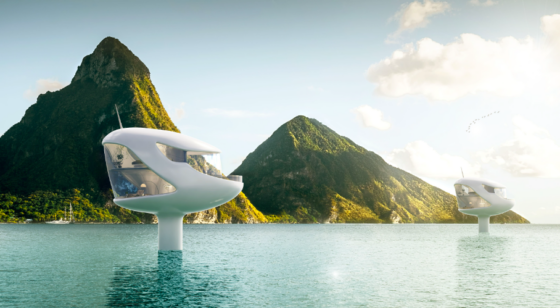 SeaPods de Sainte-Lucie (image rendue)
SeaPods de Sainte-Lucie (image rendue)"Nous plantons la graine SeaPod ici au Panama", déclare le PDG de la société dans un communiqué, "mais notre objectif final est d'avoir des maisons SeaPod dans tous les coins de l'océan, partout dans le monde".
Ocean Builders travaille actuellement sur la façon de les expédier, décomposés en 70 pièces, dans deux conteneurs d'expédition.
"Ce n'est également que la coque de la nacelle, donc l'expédition de longerons ou de stabilisateurs pourrait être un autre défi que nous devrons peut-être relever, mais comme ces choses sont en acier, il peut être possible de les construire sur place car nous n'aurons pas besoin moules », indique le site Web de l'entreprise.
"La possibilité de mettre ces maisons dans des conteneurs d'expédition donne à la planète entière un accès à nos maisons et nous espérons un jour voir des gens profiter de la vie dans nos SeaPods partout sur la planète."
Et si quelqu'un en veut un, il serait actuellement en précommande à partir de 295 000 $ et peut aller jusqu'à 1,5 million de dollars en fonction des mises à niveau.
Le marché de l'hôtellerie sous-marine face à des défis, selon un nouveau rapport
Pour ceux qui ont hâte d'essayer de vivre dans une ville flottante, le marché des hôtels sous-marins devrait atteindre 11,6 milliards de dollars d'ici 2032, selon Future Market Insights . Mais ce chiffre s'inscrit dans un contexte de nombreux défis, y compris les préoccupations environnementales.
Il s'agit notamment de recycler les déchets avant de les jeter dans l'océan et d'enlever les coraux, les roches et les algues des chantiers de construction, ce qui perturbe l'écosystème. Ensuite, il y a toutes les lumières qui perturbent la vie marine avec des sources de nourriture et des habitats en jeu. Tout cela semble rendre les projets de développement des hôtels sous-marins non viables, car ils constituent une menace majeure pour la vie marine.
Future Market Insights indique que plusieurs investisseurs retirent leur money des projets d'hôtels sous-marins en cours. Le coût de développement est exorbitant et ces hôtels nécessitent une architecture ultra-moderne avec la technologie la plus avancée pour construire. Par conséquent, leur construction est coûteuse et prend du temps.
Alors que les hôtels sous-marins exercent une énorme fascination depuis un certain temps, leur manque évident souligne les défis liés à la réalisation de ces développements et à leur transformation en une réalité commerciale.
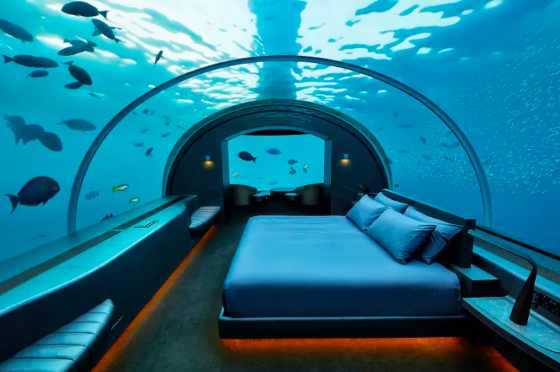 Fin 2018, le Rangali Island Resort aux Maldives a ouvert ce qu'il a appelé la "première villa sous-marine au monde". Image reproduite avec l'aimable autorisation de Luxtripper
Fin 2018, le Rangali Island Resort aux Maldives a ouvert ce qu'il a appelé la "première villa sous-marine au monde". Image reproduite avec l'aimable autorisation de LuxtripperConstruire des maisons flottantes
Une maison flottante peut être construite sur n'importe quel rivage et est capable de faire face à la montée des mers ou aux inondations provoquées par la pluie en restant à la surface de l'eau, selon la BBC. Contrairement aux péniches, qui peuvent facilement être désamarrées et déplacées, les maisons flottantes sont fixées au rivage, reposant souvent sur des poteaux en acier, et sont généralement connectées au réseau d'égouts et au réseau électrique locaux. Ils sont structurellement similaires aux maisons construites sur terre, mais au lieu d'un sous-sol, ils ont une coque en béton qui agit comme un contrepoids, leur permettant de rester stables dans l'eau.
Ils nécessitent également des infrastructures et des travaux supplémentaires pour se connecter au réseau électrique et au système d'égouts, avec des cordons étanches spéciaux et des pompes nécessaires pour se connecter aux services municipaux sur un terrain plus élevé.
Il y a des appels à la standardisation de ces types de constructions flottantes . Virginie Segura, chef de projet pour Vicastel Project Management, déclare : « Il y a un manque de réglementation de la construction dans ce domaine. Nous avons besoin d'une feuille de route, d'un ensemble de règles normalisées, pour les projets intégrant un bâtiment ou une structure flottante. » La confusion autour de la question est étayée par une décision de juin 2022 à Miami concernant un manoir flottant. Comme indiqué dans Marine Industry News , il échappera à une facture fiscale de près de 120 000 $ parce que ses propriétaires ont prouvé qu'il s'agissait d'un bateau .
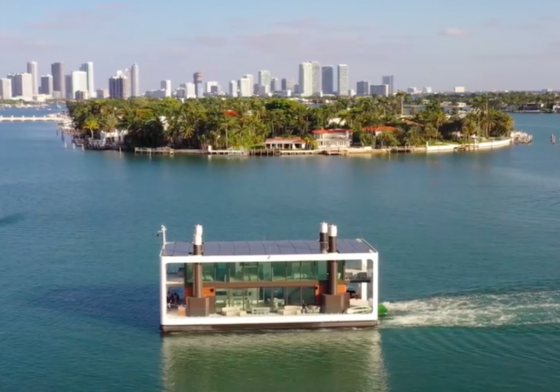
En savoir plus sur les développements aux Pays-Bas via BBC News .
